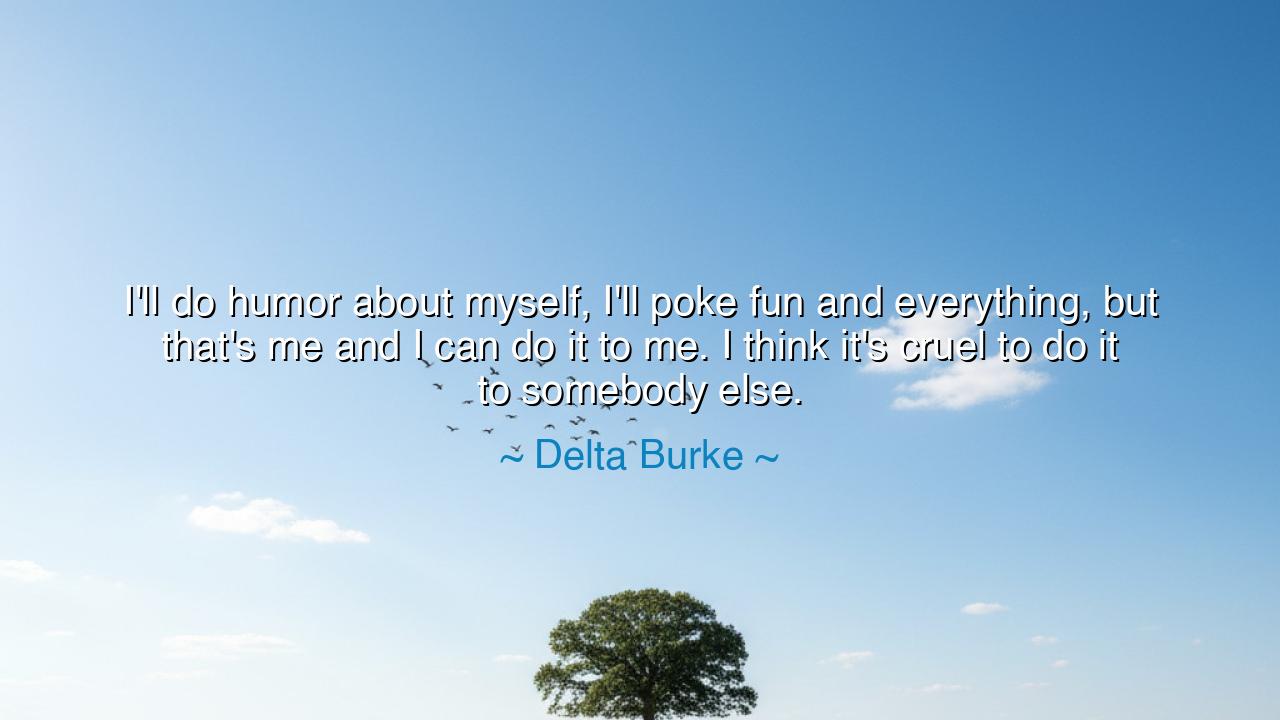
I'll do humor about myself, I'll poke fun and everything, but
I'll do humor about myself, I'll poke fun and everything, but that's me and I can do it to me. I think it's cruel to do it to somebody else.






"I'll do humor about myself, I'll poke fun and everything, but that's me and I can do it to me. I think it's cruel to do it to somebody else." These words, spoken by Delta Burke, echo a profound truth about the nature of humor and the boundaries of compassion. In an age where wit and sarcasm often reign, there is a sacred wisdom in Burke’s statement. She acknowledges that humor, when directed inward, can be a tool of self-acceptance, a way of embracing one’s own flaws with grace and lightness. Yet, when humor turns outward—when it targets others—it has the power to wound, to demean, and to disempower. Burke’s wisdom reminds us of the ancient teaching that humor, while a powerful force for connection and joy, must always be wielded with respect and awareness of its impact on others.
In ancient cultures, the role of humor was often dual-edged: it could uplift or destroy. The Greek playwright Aristophanes is known for his satirical comedies that poked fun at public figures, political systems, and human folly. Yet, even in his sharp wit, there was an understanding that the target of the humor should not be humiliated but rather illuminated. Socrates, the great philosopher, would often engage in playful dialogue with his followers, using humor as a way to reveal deeper truths. He knew that humor could open the mind and soften the heart, but it also had the potential to expose the vulnerabilities of others. To humiliate was to violate the sacred trust between the speaker and the audience. The greatest of ancient thinkers understood that humor, when used with integrity, could guide, but when used to wound, it could destroy.
Burke’s reflection on humor and cruelty calls to mind the paradox of human existence: that laughter and tears often coexist in the same moment. The ancient warrior, much like the modern individual, was taught to carry a shield not only against the sword but also against the cutting words of others. In Roman society, the concept of dignitas, the preservation of one’s honor, was paramount. An insult, a jab at someone’s character or appearance, could be a blow to their soul. The warrior or citizen who could rise above mockery, who could endure the slings and arrows of the world with dignity, was revered. Yet, they were also taught the importance of mercy and humility—that to mock or belittle another was not the path of nobility but of weakness.
In our own time, humor often carries the same dual potential. While it can bring joy and connection, when misused, it can also perpetuate cruelty, deepen divisions, and cause harm. Delta Burke’s insight serves as a reminder of the power humor has in shaping how we view ourselves and others. To poke fun at oneself is an act of self-awareness and strength, but to use humor to mock or belittle others is an act of weakness and fear. It reveals an inability to confront the complexities of life with dignity and grace. The true strength of the human spirit lies not in the ability to tear others down but in the ability to lift them up, to see their flaws with compassion, and to approach the world with humor that connects, not divides.
Think of the story of King Solomon, known for his wisdom and fair judgment. When faced with two women who claimed to be the mother of the same child, Solomon devised a clever ruse, asking for the child to be divided in two. But the true mother, whose heart was filled with compassion, immediately offered to give up her claim, choosing the life of the child over her own pride. Solomon’s wisdom lay not just in his judgment but in his ability to discern the true nature of people, to see beyond the surface and into the heart. Similarly, humor must look beyond the surface—it must be used to connect people, not to expose their weaknesses. It is through this compassionate approach to humor that we achieve a deeper understanding of one another and ourselves.
The lesson we can learn from Delta Burke's words is clear: humor must be rooted in compassion. We are called not only to laugh but to laugh with grace, to use humor as a means of uplifting, not degrading. When we turn the spotlight inward, poking fun at ourselves, we engage in an act of self-love and self-acceptance. But when we turn it outward, we must be careful, for the wounds inflicted by cruel humor are often deeper than we realize. Wisdom teaches that we must choose our words and our laughter with care, always mindful of the impact they have on the souls of others.
In our own lives, let us practice humor that nurtures rather than harms. When we are tempted to mock or belittle others, let us pause and reflect on the deeper truth that to make someone else small is to make ourselves smaller. Let us find joy in laughter that connects, in humor that uplifts, and in self-deprecation that fosters humility. By doing so, we honor both ourselves and the dignity of others, building a world where humor is a tool of unity and not a weapon of cruelty.






AAdministratorAdministrator
Welcome, honored guests. Please leave a comment, we will respond soon